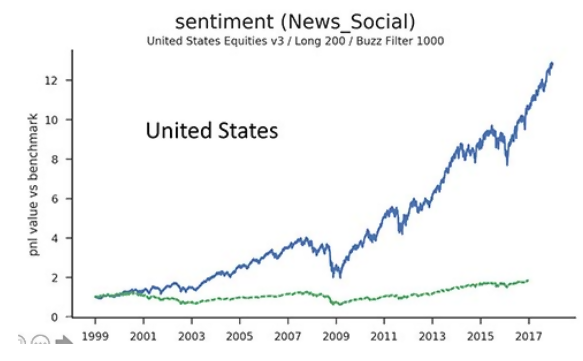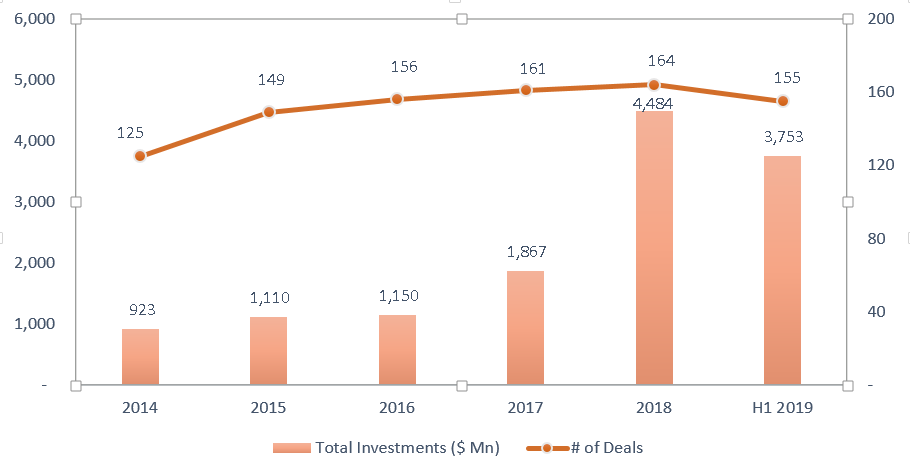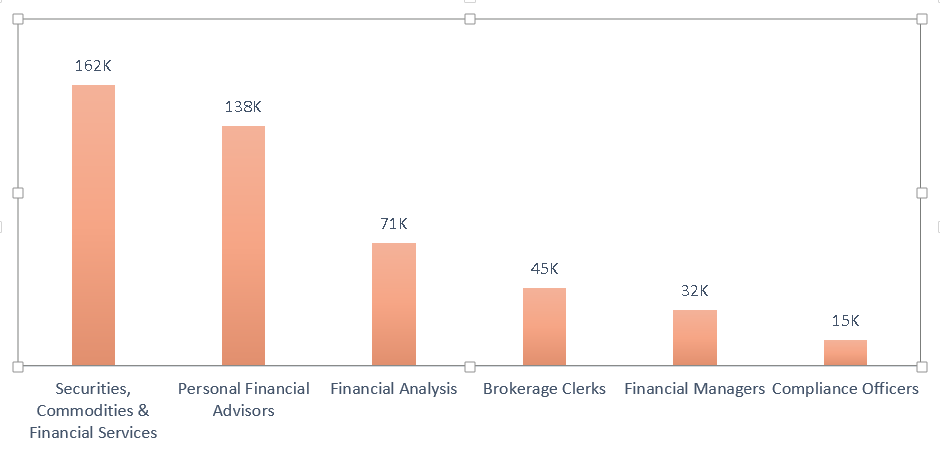The financial services sector in the US is undergoing a dramatic technology-led evolution that is changing the landscape of the entire industry. Some of the most pronounced disruptions have been caused by:
Among these trends, we explicitly analyze the impact of AI on the wealth management industry in the US.
AI has pervaded all aspects of the investment management industry with both positive and negative consequences to the end customer and the clients themselves. Investment firms are turning to technology and AI in particular to increase operational efficiencies across their front, mid and back-office to reduce costs.
In the front office, the deployment of AI is mostly to “assist” portfolio managers in their decision-making process, carried out in several ways:
In the following example, incorporating news sentiments is picking up in stocks. The chart illustrates that using a strategy based on social news sentiment, a fund manager would have generated significant alpha over the benchmark return.

Regulation and adherence to KYC (Know your customer) and AML (Anti-money laundering) is the foremost challenge for firms across the financial services industry. Asset management companies paid over $27 billion in penalties between 2008 and 2018 due to non-compliance with KYC and AML guidelines. (Fintech Global) To combat the problem, quite a few regulation technology or RegTech firms have emerged to help financial institutions manage and automate their compliance processes.
Between 2014 and 2018, VC and PE funds have invested close to $9.5 billion into these firms globally, signifying the importance of these technology companies to running the day to day operations of financial institutions. Also, in the first half of 2019, investments have already touched $3.7 Billion, marking a robust start to any of the preceding six years. Automation in regulation is a trend that is here to stay.

A Deloitte study of 95 asset managers across the US, Europe, and the Asia Pacific region found that spending on technology as a clear differentiator between successful investment managers and firms that are not as successful in growing their businesses. According to the survey, the top 25% of the fastest-growing firms did so by out-spending the other 75% on technology. These firms spent an average of 9% of their revenue between 2015-18 on technology versus 7% by the remaining 75%. In addition to the faster growth rates, the top 25% of firms had the advantage of lower costs and higher margins than their competitors.
With increasing automation brought on by AI, millions of jobs in the financial services industry are at risk. A study by an independent research firm predicted that there are 6.5 million jobs currently exposed to AI with the likelihood of thousands of job losses in the financial services industry by 2030.

Competition in the financial services industry has been intense for generations. However, the new age and non-traditional competitors like Amazon, PayPal, and Alipay, have blurred the boundaries between financial services and technology firms. The customer has a broader choice of financial products with easier access than ever before. This will eventually force traditional firms to either innovate and stay competitive or consolidate with a stronger player.
One of the most notable trends in the wealth management industry over the past decade, specifically in the US, has been the emergence of low-cost ETFs or exchange-traded funds. These are funds that track a benchmark, with highly automated auto-rebalance and order placements and minimal manual intervention.
They compete with the traditional funds that are managed by experienced fund managers with the sole objective of beating the benchmark. The assets under management (AUM) by these ETFs totaled $4.5 trillion (by the end of Oct 2019) for just the US-listed ETFs, a clear record.
In-fact, September 2019 was a historic month when assets under management for these funds outstripped the active funds in the US and this trend is just accelerating. With the menu of options increasing for these low-cost ETFs and with AI now increasingly being used to pick up stocks that make up the ETF portfolio, the shift towards a low-cost passive fund is here to stay.
These funds generate significant cost savings for customers who would pay as low as 5-10 bps as investment cost as against the 1% for active funds. This is a tremendous cost-saving exercise for clients with no demonstrable loss in returns.
The financial services sector in the US, especially the wealth management industry, are not insulated from the changes brought about by digitization across the front, middle and back-office operations.
More data is being produced today than ever before and the human ability to sort, process and generate meaningful insights from this data is becoming increasingly dependent on machines using techniques such as Natural Language Processing (NLP) and Artificial Intelligence (AI). This trend is going to accelerate. Firms that remain relevant and successful through this evolution will be those that invest in technology to innovate and differentiate.
Job losses will occur across traditional roles that will be made redundant with automation. On the positive side, the cost for investors would also decline (as is already happening over the last decade or so), and the choice of products will surge. While most of these changes are already taking place, the pace of change will increase rapidly in the future. Firms will have to evolve to survive, and there is no alternative. AI today is not good to have, it is fast emerging as must-have for survival.